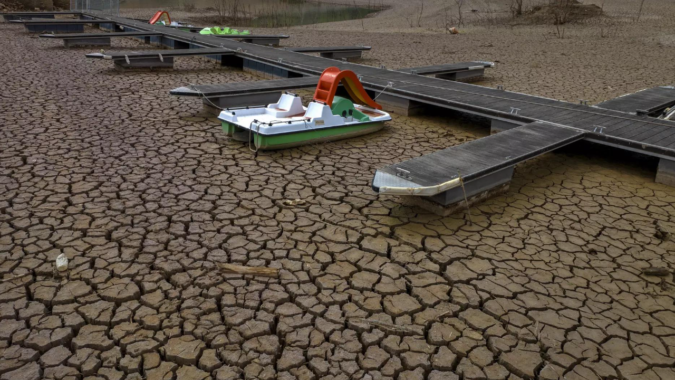BARCELONA: Spain‘s prime minister warned lawmakers Wednesday that the acute drought afflicting the southern European country has become one of its leading long-term concerns.
“The government of Spain and I are aware that the debate surrounding drought is going to be one of the central political and territorial debates of our country over the coming years,” Prime Minister Pedro Sanchez told the Madrid-based Parliament.
The territorial tensions between regions over water that Sanchez referred to are already being seen in protests over the rerouting of water and disputes between farmers and ecologists.
Three years of scant rainfall and high temperatures put Spain officially into long-term drought last month.
The national weather service said 2022 was the hottest year ever recorded, when average daily temperatures rose above 15 degrees Celsius (59 degrees Fahrenheit) for the first time since records started in 1961. The country has warmed 1.3 degrees Celsius (34 F) since the 1960s, a warming that is noticeable all year round but especially in summer when average temperatures have risen by 1.6 degrees.
The Mediterranean region as a whole is warming faster than the global average due to climate change caused by the release of greenhouse gases, experts and authorities say.
And there is no sign of the situation in Spain improving over the coming weeks.
That has led to water restrictions in the driest areas. Regional authorities in northeast Catalonia said this week that Barcelona and a wide surrounding area that’s home to some 6 million people could enter a drought “emergency” by September unless forecasts prove wrong.
The reservoirs that provide northern Catalonia with water have shrunk to 27% of capacity. Only the reservoirs connected to the Guadalquivir river basin in southern Andalusia are worse off, at 26% of capacity.
Andalusia and other agricultural areas are bearing the brunt of the drought as farmers lose crops.
Spain’s forests are also suffering as firefighters battle blazes that are normally not seen until the hottest summer months.
Sanchez, a Socialist leader who faces a general election in December, said that a priority of his government is to invest heavily to “help recover our rivers, improve our water purification and cleaning systems and the reuse of water, and digitalize our water management.”
“This is clearly our responsibility, our duty, because the challenge we face from climate change and water stress is evident,” Sanchez said.
“The government of Spain and I are aware that the debate surrounding drought is going to be one of the central political and territorial debates of our country over the coming years,” Prime Minister Pedro Sanchez told the Madrid-based Parliament.
The territorial tensions between regions over water that Sanchez referred to are already being seen in protests over the rerouting of water and disputes between farmers and ecologists.
Three years of scant rainfall and high temperatures put Spain officially into long-term drought last month.
The national weather service said 2022 was the hottest year ever recorded, when average daily temperatures rose above 15 degrees Celsius (59 degrees Fahrenheit) for the first time since records started in 1961. The country has warmed 1.3 degrees Celsius (34 F) since the 1960s, a warming that is noticeable all year round but especially in summer when average temperatures have risen by 1.6 degrees.
The Mediterranean region as a whole is warming faster than the global average due to climate change caused by the release of greenhouse gases, experts and authorities say.
And there is no sign of the situation in Spain improving over the coming weeks.
That has led to water restrictions in the driest areas. Regional authorities in northeast Catalonia said this week that Barcelona and a wide surrounding area that’s home to some 6 million people could enter a drought “emergency” by September unless forecasts prove wrong.
The reservoirs that provide northern Catalonia with water have shrunk to 27% of capacity. Only the reservoirs connected to the Guadalquivir river basin in southern Andalusia are worse off, at 26% of capacity.
Andalusia and other agricultural areas are bearing the brunt of the drought as farmers lose crops.
Spain’s forests are also suffering as firefighters battle blazes that are normally not seen until the hottest summer months.
Sanchez, a Socialist leader who faces a general election in December, said that a priority of his government is to invest heavily to “help recover our rivers, improve our water purification and cleaning systems and the reuse of water, and digitalize our water management.”
“This is clearly our responsibility, our duty, because the challenge we face from climate change and water stress is evident,” Sanchez said.
